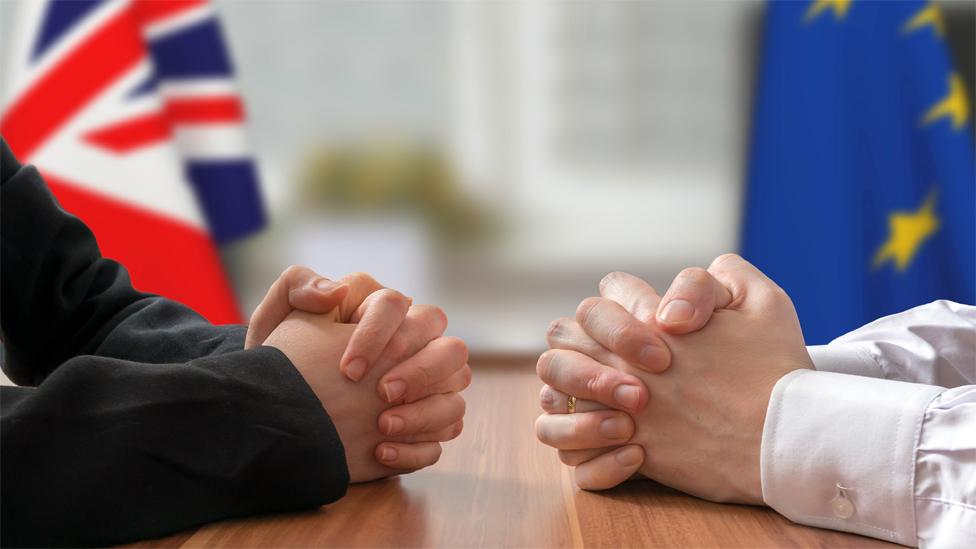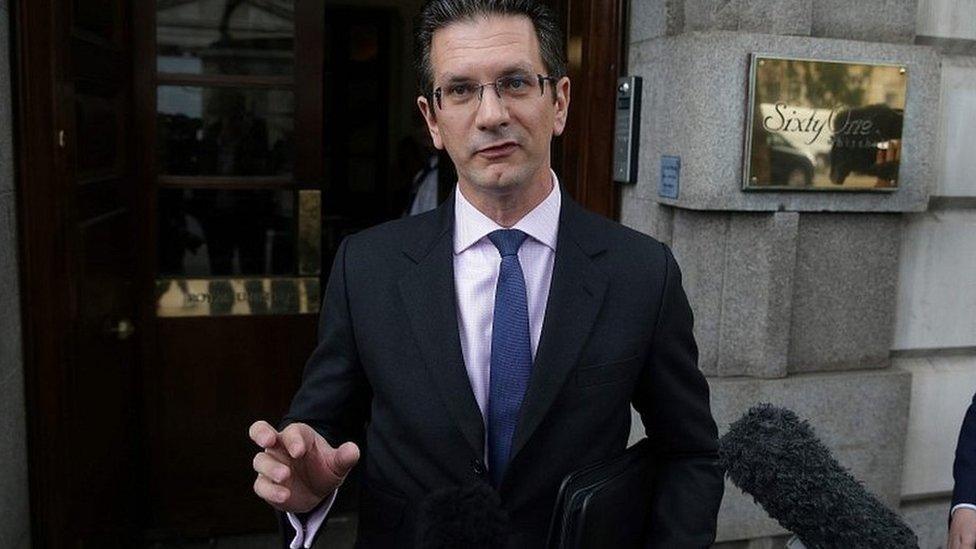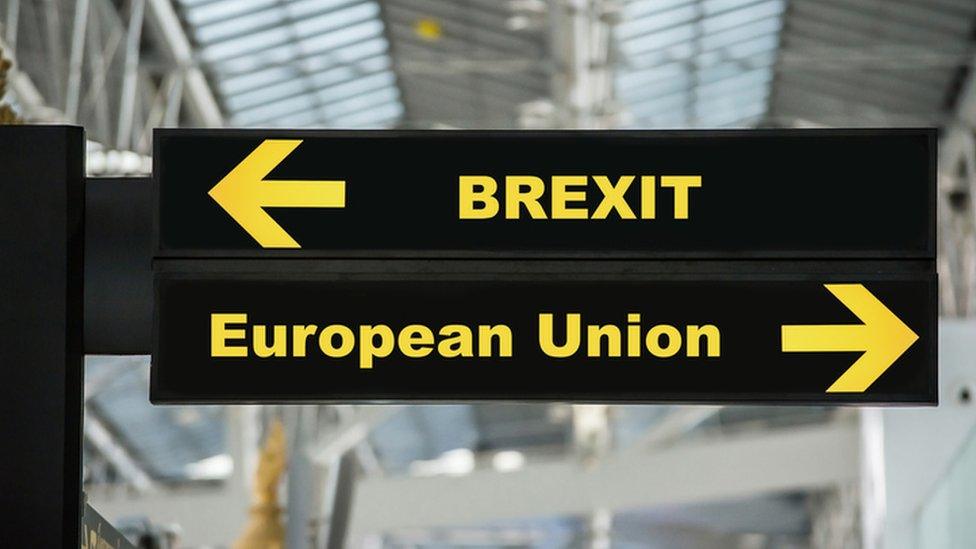Brexit: Hold your nerve, Raab tells 'jittery' Tories
- Published
Dominic Raab: "Now is the time to play for the team"
The Brexit Secretary has said he understands Tory "jitters" about EU negotiations but urged MPs to hold their nerve as talks continue.
"The end is in sight in terms of a good deal, the prize we want," Dominic Raab said, asking them to "wait and see".
It comes amid newspaper speculation that Theresa May could face a vote of no confidence from Tory MPs.
On Saturday, protesters marched through London to call for a public vote on whatever Brexit deal is negotiated.
Some Tory MPs were angered last week by a suggestion that the post-Brexit "transition period" - designed to smooth the path between the UK leaving the EU in March 2019 and a future long-term relationship with Brussels - could be extended.
Ex-Tory leader and prominent Brexiteer Iain Duncan Smith said that would see the UK paying the EU "tens of billions" more and he said the negotiations "look more like a capitulation".
Moray MP Douglas Ross said Scotland's 13 Conservative MPs would not support a deal if the UK remained part of the Common Fisheries Policy beyond 2020.
And Tory backbencher Andrew Bridgen told the Mail on Sunday, external Theresa May was "drinking in the last chance saloon" and must attend a meeting of the 1922 committee of Conservative backbenchers this week.
Mr Raab told the BBC's Andrew Marr Show that he was "open minded" about the possibility of extending the transition period - which the government calls the implementation period - for about "three months or so" if needed, as long as it was clear how the UK would get out of it, to avoid "any sense that we are left indefinitely in a sort of customs union limbo".
He said: "I think it's understandable there are jitters on all sides of this debate and we need to hold our nerve. The end is in sight in terms of a good deal - the prize we want - a good deal with the EU and I think colleagues should wait and see what that looks like."
He added: "We won't want to bring something back which we aren't confident is a very good deal for the United Kingdom. But now is the time to play for the team, I think that's the way we get the best deal for the EU and I also think that's what the country expects from us."
Asked if, realistically, the withdrawal agreement could still be being negotiated after November, he replied: "I think if it went any distance beyond that we would have a problem with implementing the deal, and it would almost be the worst-case scenario - we'd have a deal but couldn't implement it in time."
Saturday saw huge crowds march in London to demand a further EU referendum
Meanwhile Brexit minister Suella Braverman has told the BBC's Pienaar's Politics that she supports the prime minister, but refused to say whether she would back her in a confidence vote.
She said: "I don't think there will be a vote of confidence in the prime minister and I am supporting the prime minister unequivocally and I want her to get on with the job to deliver Brexit and I know that she will be doing that."
The UK voted to leave the EU by a margin of 51.89% to 48.11% in a referendum in June 2016.
It is due to leave on 29 March 2019 but during the post-Brexit "transition period", set to run until 31 December 2020, the UK-EU relationship will stay largely the same.
If at the end of that period, a long-term "future relationship", including trade deal, is not ready, both sides have agreed on the need for provisions to ensure there is no need for customs checks - a "hard border" - between Northern Ireland and the Irish Republic, in the interim period.
This is called the "backstop" - but the two sides have yet to agree on what form it should take and how long it could last.
Keir Starmer: If a deal is made by the end of the year, it won't last
On Saturday, protesters took part in a huge march to London's Parliament Square to call for another referendum - this time on any final Brexit deal that is negotiated. Organisers say it attracted about 700,000 people.
Labour's shadow Brexit secretary Sir Keir Starmer said the march reflected "a much bigger group, both Leave and Remain [voters], who are utterly losing confidence in the prime minister's ability" to bring back a good deal.
Asked if Labour MPs would back Mrs May in Parliament, rather than risk a "no deal" exit from the EU, he said: "We do not accept this proposition it's that or no deal, and it's not just us. There's a huge majority in Parliament that will not accept that the alternative to Theresa May's deal, if there is one, is no deal."
He added: "I don't think anybody thinks this 30-year civil war in the Tory party on Europe is going to end before Christmas.
"What we're going to see is even if there's a deal, the Tory party will try to rip it up next year... They will not stop fighting about this.
"We've got to the very serious situation where people are saying 'Is this government actually capable of delivering because it's so divided?'."
There has been criticism of the language reported from unnamed Tory sources about Mrs May's future as Conservative leader about her entering the "killing zone" and telling her to "bring your own noose".
Scotland's First Minister Nicola Sturgeon tweeted:
Allow X content?
This article contains content provided by X. We ask for your permission before anything is loaded, as they may be using cookies and other technologies. You may want to read X’s cookie policy, external and privacy policy, external before accepting. To view this content choose ‘accept and continue’.

Former cabinet minister Theresa Villiers, a Brexiteer, described the newspaper comments as "disturbing" while the Conservative peer Lord Lilley told BBC News the language was "unpleasant and objectionable": "On either side, that sort of language should not be used."
- Published21 October 2018

- Published21 October 2018

- Published30 December 2020

- Published1 February 2018

